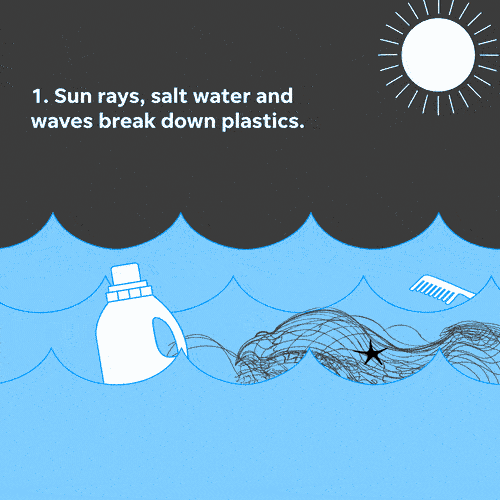top of page
BIOPLASTIC

The
New Beginning

Issues with Plastic
Plastic Has Polluted the Planet



1 SECOND
TO PRODUCE
A PLASTIC BAG
20 MINUTES
OF USE

MORE THAN
450 YEARS
OF POLLUTION


Plastic is all over the world, in cars, electronics and even in the clothes we wear. It has become staple in our daily lives and because of this the production of plastic has increased rapidly through the years. Nearly 50% of plastic produced is for packaging of consumer goods. This plastic will be used briefly and then thrown away, making its way into landfills or end up in marine life waters.
Microplastics
Microplastics are very small perticles of plastic material. They are very toxic to the marine wildlife as it can cause problems with digestion. As plastic floats in the waters, it can also begin to absorbs toxic chemicals, damaging the animals system. As the marine animals continue consuming the microplastic, it ends up in the food chain. The animals are consumed and the mircoplastics end up in the human system, making it impossible to clean out. Microplastics can also leak toxic chemicals into the food chain through the soil. According to the Plastic Oceans Foundation: “When broken down into tiny pieces, plastic attracts toxic chemicals released over decades from industry and agriculture, the concentration of which increases as they move up the food chain.” Some microplastics have also been found in the air we breathe, risking respiratory problems.

Wild Life Endangerment
Plastic pollution has killed many marine animals. As plastic enter the waters, many animals become entangled in bags, soda can rigs and fishing line and this can result in severe injuries. Plastic is also consumed by animals, mistaking it for food such as jellyfish. This can do harm to the animals digestion system, blocking their intestines and leading to starvation and death. There have been many news reports on animals found with plastic in there stomach and around there neck. A young whale was found washed up in the Philippines with 88 pounds of plastic in the stomach. This caused the whale to vomit blood and eventually die from dehydration and starvation. It is estimated by the Plymouth University that plastic kills over 100 million marine mammals each year.



 |  |  |  |
|---|---|---|---|
 |
bottom of page